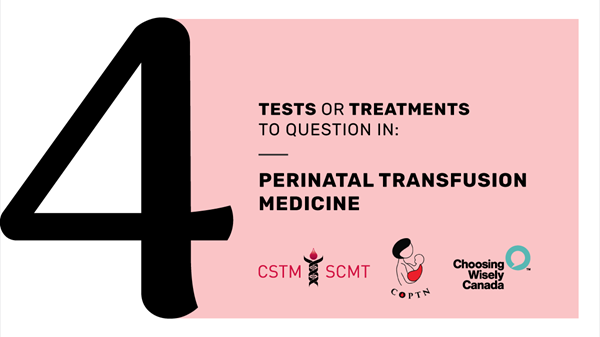Choosing Wisely Perinatal Recommendations

Choosing Wisely Canada, in collaboration with the CSTM Canadian Obstetrics and Pediatric Transfusion Network (COPTN), has released the CSTM’s four new Perinatal recommendations.
The COPTN compiled its Choosing Wisely Canada list of recommendations by putting out a call to its membership for suggested list items. The chairs of COPTN compiled these suggestions and developed the rationale and references. These statements and rationale were presented virtually to the COPTN committee who ranked the suggestions according to their importance and refined the wording and the order of the item lists.
The Canadian Obstetrical Pediatric Transfusion Network (COPTN) is a sub-committee of the CSTM. It was founded in 2017 and its mandate is to assess, analyze and strive to implement best practices in pediatric and obstetrical transfusion practice in Canada.
June 2021: To avoid confusion, statement 2 has been revised to better distinguish variably reactive RhD and variant Ds.
The likelihood of requirement for transfusion at the time of delivery is low. In a patient with a prenatal record confirming maternal ABO, Rh and a negative antibody screen provision of emergency uncrossmatched units is relatively safe when required on rare occasions. Routine pre delivery group and screen is not cost effective given the very low risk of transfusion with either vaginal delivery or routine Caesarean section. In the rare occasion that patients require a blood transfusion, O negative un-crossmatched blood or a stat crossmatch could be done pre-transfusion.
Sources:
Serologically weak reactions with Anti D antisera (≤ 2+) should be investigated with RHD genotyping. Pregnant mothers with weak or variably reactive RhD typing and with pending genotyping results should be treated as RhD negative and should receive RhIg. Patients with genotyping confirming weak D type 1, 2 or 3 should be treated as RhD positive. Patients with other weak and variant RHD genotypes should be treated as RhD negative.
Sources:
- Flegel et al. It’s time to phase out “serologic weak D phenotype” and resolve D types with RHD genotyping including weak D type 4. Transfusion. 2020 Apr;60;855–59. PMID: 32163599. https://pubmed.ncbi.nlm.nih.gov/32163599/
- Sandler et al. It’s time to phase in RHD genotyping for patients with a serologic weak D phenotype. Transfusion. 2015 Mar; 55(3): 680–89. PMID: 25438646. https://pubmed.ncbi.nlm.nih.gov/25438646/
Testing of a paternal sample and finding a negative antigen status (when paternity is assured) and/or non-invasive prenatal determination of the fetal genotype from maternal plasma with prediction of a negative antigen status confirm that the fetus is not at risk for hemolytic disease of the fetus and newborn and that ongoing pregnancy monitoring is unnecessary.
Sources:
The DAT is not a screening test for hyperbilirubinemia or hemolytic disease. Routine assessment of the DAT may reveal cases of ABO incompatibility which are clinically insignificant; conversely the DAT may fail to identify significant hemolysis due to non immune causes. The DAT should be performed only when anemia or hyperbilirubinemia is suspected or when maternal alloantibodies are present.
Sources: